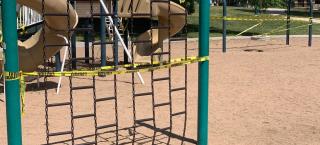
Story
The Moment Covid-19 Became Real
By the History Colorado Staff
This is how it began. We asked our History Colorado colleagues when they first realized the Covid-19 pandemic was going to significantly impact their life. While each of their stories is unique, their answers offer a collective portrait of events unfolding a year ago.
We are in a season of grim anniversaries, as each day marks a year since the Covid-19 pandemic made its presence felt in our lives in one way or another. This pandemic did not arrive in a singular moment, a single collective event destined to become a generational touchstone like the 9/11 attacks or the Challenger explosion or the assassination of JFK. Instead, it arrived bit by bit, realization by realization, slowly drawing closer and closer to our own lives until it finally, unmistakably, irrevocably forced us to reckon with it.
It was on March 13, 2020, that we closed the History Colorado Center and our museums around the state out of care for our communities. As we approach that anniversary, we asked our History Colorado colleagues when the Covid-19 pandemic became real for them? What was the moment when they realized it was going to significantly impact their life?
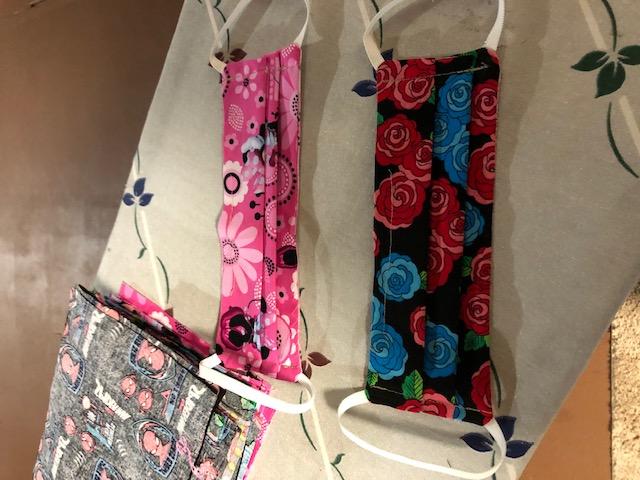
The women's group “Dena's Mask Making Army” makes masks at home for health-care workers on the front lines of the pandemic. Photo by Mary Carson.
The day the museums closed looms large in our memories, but each story reminds us of the multiple ways in which Covid-19 immediately began to change our lives. From these individual experiences, a fuller collective portrait of the pandemic's early days emerges. They add another aspect to our ongoing effort to preserve a record for future generations of what it has been like to live through this historic moment.
Below are the memories shared by our History Colorado family, arranged chronologically. We hope it inspires a conversation with your family and friends. We also hope you’ll consider adding your story to our effort to record the many ways that the pandemic arrived in our individual lives.
If you’d like to share the moment Covid-19 became real for you for History Colorado’s archives, you can tell us about it on our History in the Making hotline at 720.466.8215, connect with us on social media by tagging us at @HistoryColorado on your favorite platform, or email us at HC_Covid19@state.co.us.
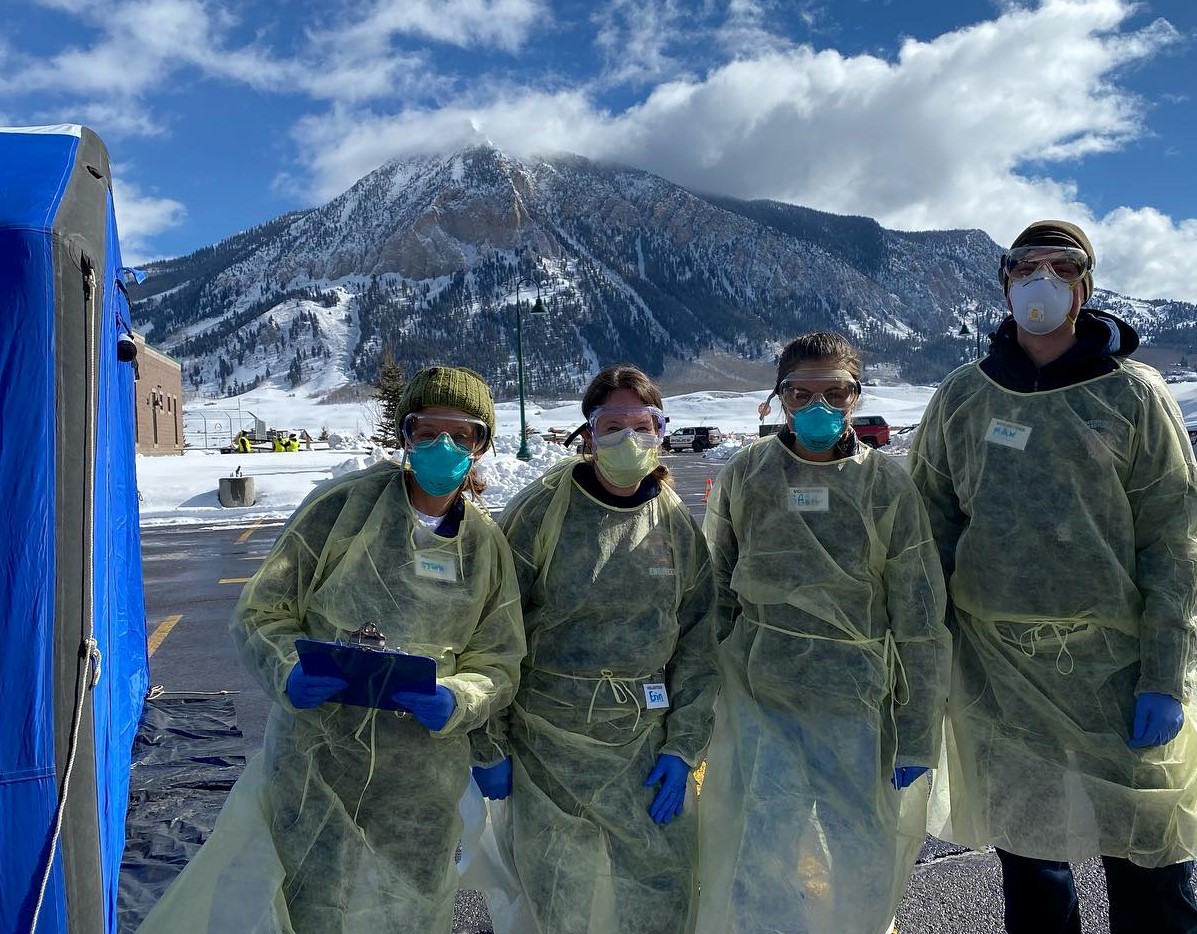
Covid-19 testing centers were set up across the state, including many makeshift drive-up facilities such as this one in Crested Butte, Colorado.
I was checking my personal email on February 27 and noticed my step brother sent my parents an email urging them to return earlier than planned from a trip they were taking in Central America. Normally my step brother is very relaxed and does not worry much about things so his email really made me think twice but I did not take it seriously until my phone started lighting up the next day with more and more texts from both of my step brothers urging me to talk to my parents to see if I could convince them to come home earlier. It was the text messages that really made me aware of how serious things were becoming. A few weeks later (with my parents safely at home) I received an email from my kids' school district notifying us that they were starting remote learning . . . we thought that would be for two weeks . . .
- Emily Dobish, Director of Volunteer Engagement
My grandmother passed away from cancer on March 4, 2020. My mother flew out from California to see her, and we visited her in the hospital in Colorado Springs several times in the week before she passed away. Every day that we visited, we were greeted by a large hand sanitizing station, but no masks were required, and my grandma sometimes had six or seven visitors at a time.
The very next day, March 5, 2020, the first cases of Covid-19 in Colorado were confirmed. The virus became real for me that day, along with the realization that if the timing had been slightly different (by mere days), we wouldn't have been able to make those visits to the hospital to say goodbye. I didn't know if we should feel grateful for this, or if gratitude would “cancel out” our grief. By the time I was sitting with my colleagues on March 13, hearing that we would close the museum, Covid felt like a foregone conclusion to me.
- Jessica Pierce, Membership Manager
Funny story - I kept denying there was a problem at all. It was early March, and I was in Virginia Beach visiting my brother who was in town for only a short time (he's a Major in the Marine Corps) and we literally found this one happy moment to cross paths. While I was there my husband was calling me absolutely panicked saying they were considering shutting things down and that I had to fly home immediately. Well, I refused because I felt this was all a huge overreaction. I didn't bother to cancel or reschedule the pending events we had coming up at the Grant Humphreys Mansion thinking everyone was overly concerned and that we'd all be fine. Oh boy I was soooo wrong.
My brother was immediately recalled back to Germany, and my trip to the beach ended up with me in my hotel room calling brides, grooms and other events to tell them their anticipated event had to be postponed—that was probably the worst part. Some of them cried. Some were angry. But we all knew that we had no choice.
- Rita Rollman, Director of Grant-Humphreys Mansion
At a regular Wednesday work meeting (remember sharing banana bread?) on March 11, discussing the not-so-regular affairs escalating around Covid-19, my cell phone, silenced, had been quivering with near-continuous alerts of the announcement—the WHO had just declared a pandemic. Unnerved, I’m afraid I blurted out the news rather unceremoniously at the end of the meeting. The next day, amid talk of everyone being sent home to work for “however long,” I headed for Costco to pick up some should-we-need-to-isolate bits. I sped around the shop, queued up at the cashier, and the woman in front of me glanced—then took a second look—at my trolley as if I were completely mad. I had grabbed dead practical things: huge bags of dried pintos, chickpeas, rice; a #10 can of crushed tomatoes; two large jars of 505 Green Chile Sauce; three five-pound bags of coffee beans; coffee filters. She had three boxes of PowerBars and a case each of Diet Coke and Gatorade. I definitely looked like a desperate “Prepper.” And, my kids were definitely going to hate this . . .
Within a day or so, I was back at Costco buying latex gloves and face masks for my daughter, whose supermarket employer refused to provide protective gear for their employees. Hand sanitizer and toilet paper were nowhere to be found—the whole world had become Covid-shaped and on standby.
- Lori Bailey, Ute STEM Project Coordinator / Publications Editor
It was at a banquet on March 11 when Covid-19 became real for me. Our Beer Here! exhibition had won an award, and there was a fancy soiree to present it. During the banquet, you could see phone screens lighting up in waves around the room with news alerts. Travel from Europe was suspended. The NBA season was on hold. Tom Hanks and his wife had tested positive. With each news flash, the crowd grew a little thinner. By the end of the night, my wife and I felt like we needed to hurry home and start preparing, although for what we weren't exactly sure yet.
- Jason Hanson, Chief Creative Officer
I guess I realized it was real from the day I saw American citizens being allowed to travel back into the country while foreigners were being banned. However, it has only been recently that the psychological consequences have begun to take a serious toll on myself and my wife. Because we are an ocean apart and she is not an American citizen—or vice versa—because of travel restrictions on me, if I want to visit her—it is beginning to feel like a life sentence with no visitation rights and no possibility for parole. Please people—buckle down and let's get through this. Don't let your guard down!
- James Peterson, Assistant Curator for Artifacts
We had our last in-person school group on March 12 at the History Colorado Center: seventy-five 4th grade students from Cesar Chavez Academy in Pueblo, for a 1:30 tour. I remember telling them I was so happy they were the last group we were going to have for a while, because they'd been awesome to teach. Smart, funny, super interested and engaged in the stories of the exhibits we visited—all the things you hope for with a class, especially at the end of a long day of programs. They'd also been totally amenable to extra bathroom breaks, and for once I was actually encouraging the students to use the hand sanitizing stations VERY liberally instead of reminding them that they'd (theoretically) just washed their hands and they didn't all need to set the devices off! When we sent them on their way that afternoon and the atrium slowly got quieter without all of the echoes of students' voices coming down the staircase, it felt like a chapter closing.
- Josie Chang-Order, Field Trip Manager
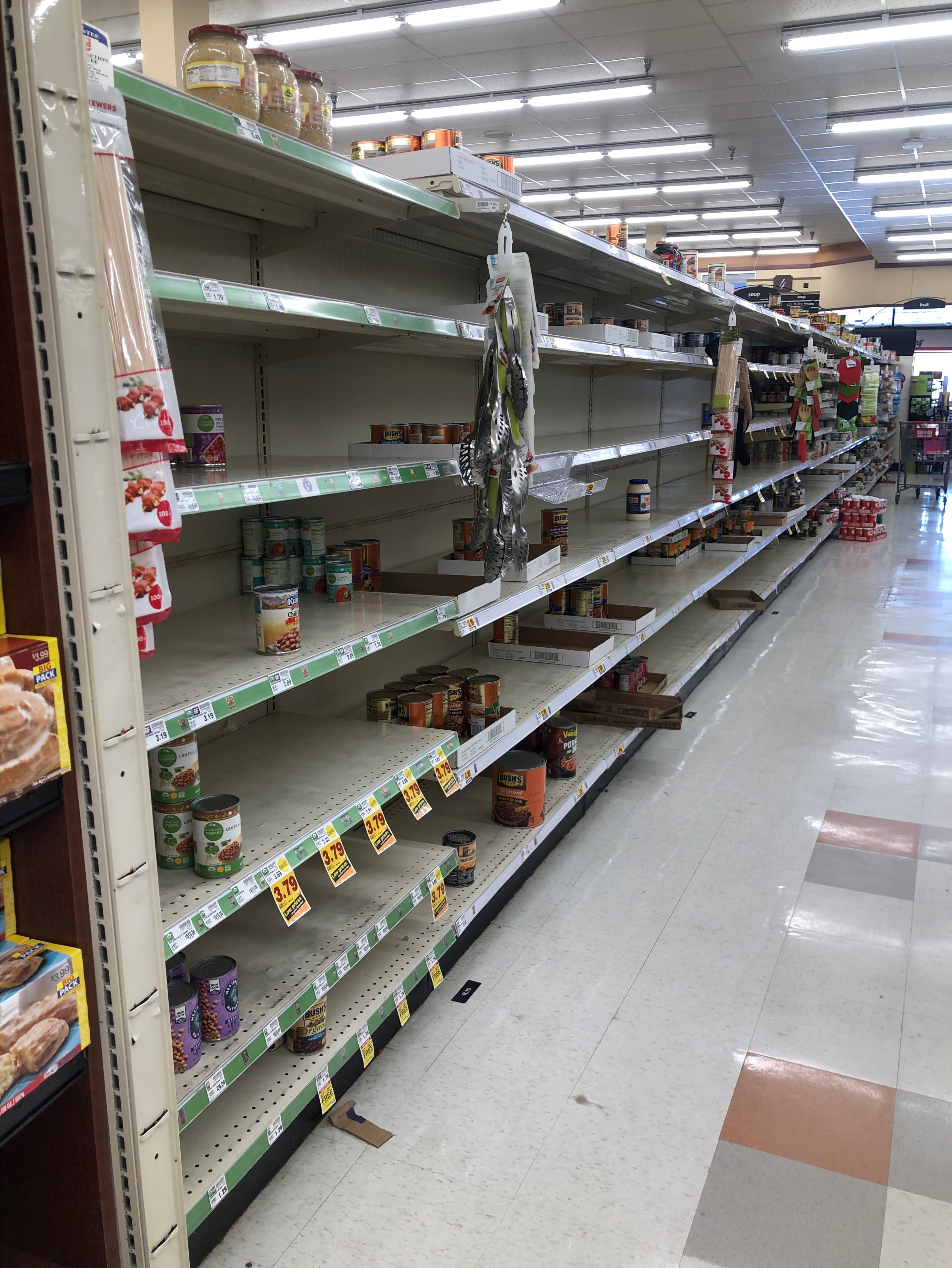
These Arvada, Colorado grocery store shelves reveal the panic buying that transpired as a result of shoppers stocking up during the pandemic lockdown of 2020.
It was Thursday night, March 12, and I strolled down decimated grocery aisles devoid of vegetables, pasta, meat, or toilet paper. My daughter was unexpectedly home because her California university campus had closed. I was getting messages saying that my 7th grader’s school was shuttered. This was the moment I knew Covid would change our lives.
- Dawn DiPrince, Chief Operating Officer
The overstock of things like canned goods, Lysol, and Tylenol in my house is a constant and painful reminder of when the pandemic became real for me. Shameful, embarrassing fits of panic-buying were my initiation into all of this. The shock and disappointment of senseless stockpiling was just so awful and discouraging. I can remember military-jet flyovers in those early days, and howling for healthcare workers at 8 pm. Such desperate, hopeless cries for solidarity amid so much pathetic, runaway greed. What a terrible time for our nation. I doubt that I will ever live it down.
- John Eding, Communications and Public Relations Manager
If I had to pin down one moment when it all became real, when I realized that this would significantly impact my life, then I would say it was the morning that we closed the History Colorado Center. [Executive Director] Steve Turner called an emergency all-staff meeting and told us that we were closing the museum and that folks were encouraged to either work from home or spread out so we weren't working right next to each other. I couldn't believe all this was happening because of a virus! A few days later, I found myself sitting on the floor of the Living West exhibit where the rest of my team had been deep-cleaning. My coworkers and I all listened as our supervisor did her best to describe what working from home would look like for a team that is centered on serving visitors. We were beginning to discover that Guest Services is a very difficult industry when there are suddenly no guests to serve.
- Emily Turner, Reservations Coordinator
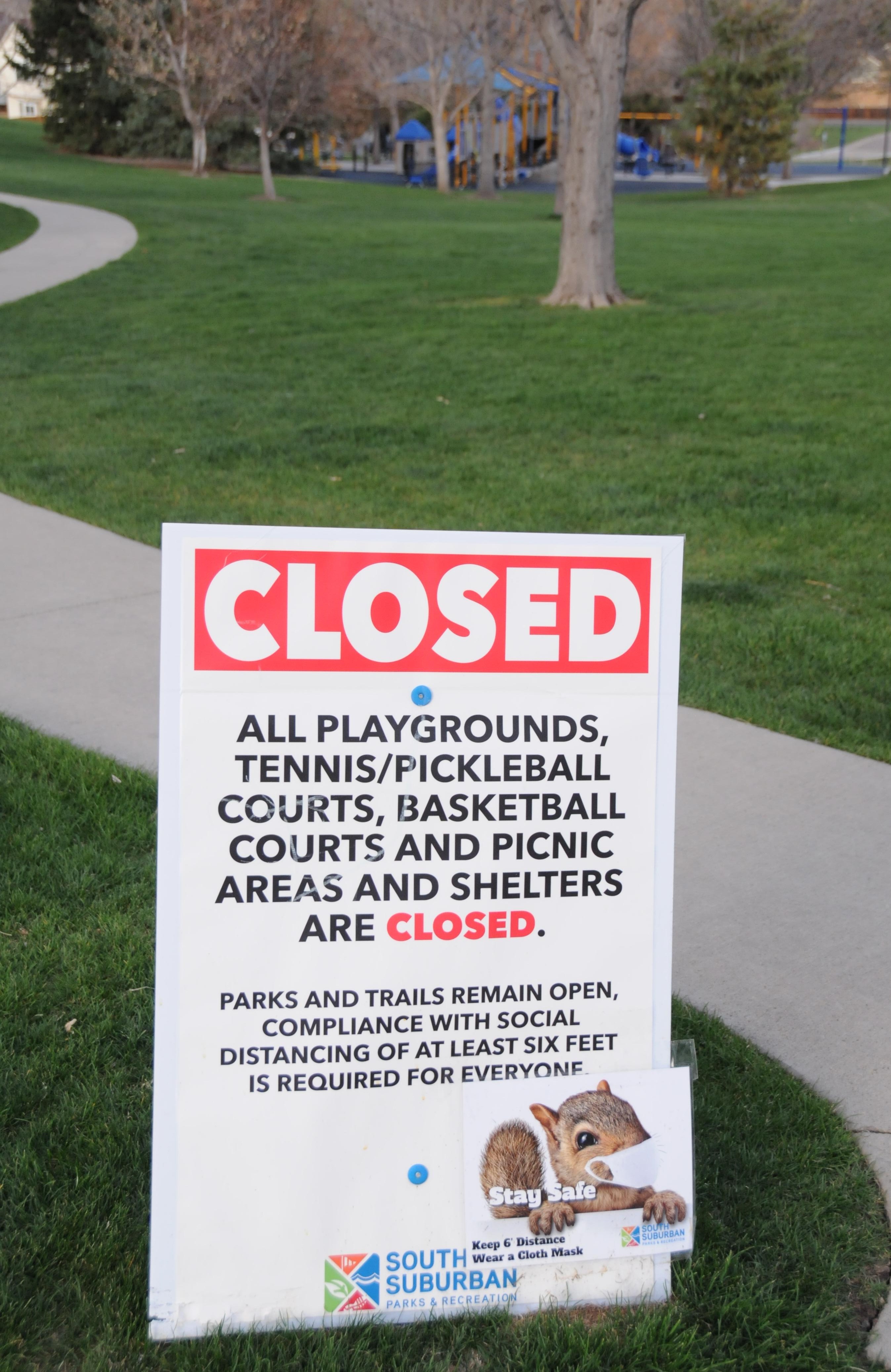
Covid-19 safety protocols forced people to alter most of their daily routines—including indoor and outdoor exercise—as demonstrated by this closure sign in Arapahoe Park, Centennial, Colorado. March 2020.
My son's twelfth birthday party was planned for March 13, 2020—a sleepover with a few friends, then an escape room with some additional friends the next day. This was also the first day that the school district closed—and of course History Colorado. Some parents were nervous and undecided about allowing their kids to come, but most of them did. It was the realization that this might be the last time the boys would get to hang out for quite some time that made it real. They are at a critical age (middle school) when friends become the center of your universe, so it has been painful to see the separation that this pandemic has forced on them. We were able to have his thirteenth birthday this past weekend, but very different—all outdoors, masks of course, all food and drink in single serving packages. Hopefully they will get to go back to the more normal schedule and interactions soon, and that resilience overcomes any trauma.
- Gheda Gayou, Deputy Director, State Historic Fund
Covid-19 became real for me Saturday, March 14, when I used the Frequent Flyer commuter bus line to Longmont to visit a good family friend. Even though there weren't more than ten people on the bus, it was the first time I ever was afraid for my health in a public space. Every time someone walked by me, I was paranoid they would breathe on me or infect me somehow. Because we didn't really know how the virus spread, I felt guilty for traveling to friends, which would end up being the last time I traveled by bus for six months and the last time I saw that dear friend in person. Because I don't have a car, I weirdly mourn the loss of public transportation. It felt so freeing to know I could get anywhere along the I-25 corridor whenever I wanted (well, whenever the schedule allowed). And yet I also feel supremely lucky to be able to choose not to take public transportation because of my central home location and the friends and family in my germ pod who willingly drive me places when I need. Even though I've always felt public transportation was germy, I've never before worried that I would be the carrier of disease because of my choice not to have a car. Now, it's all I think about.
- Kimberly Kronwall, Exhibits and Loan Registrar
Saturday, March 14, my friend somehow convinced me to go to Copper (he was afraid that they were going to close down all the resorts—he wasn’t wrong). We agreed if there were too many people or we felt weird about anything, we would just come back. There really wasn’t anybody on the mountain that afternoon. We stopped at Beau Jo’s in Idaho Springs. Pass on the salad bar. (Just didn’t seem right…) Got emails on our phones about Copper (and all the other resorts) closing behind us.
I was still in denial that the pandemic was going to last very long until I had to cancel the rest of the Program for Avocational Archaeological Certification classes on Friday, April 17. Holly Norton [the State Archaeologist] started “Operation Mask Making” with some staff and volunteers. I had no idea I would be staring at my little corner desk office made to be partly used once a week on my “work-from-home” day for over a year straight. For the record, Minnie (my dog) is not helpful in issuing archaeology permits.
- Rebecca Simon, Assistant State Archeologist
The pandemic became real to me when I realized I could no longer visit my mom in the nursing home. Unfortunately she suffered deeply because of this. We are still not entirely sure if her passing was the direct result of her contracting Covid-19—regardless, it had a huge negative impact.
- Todd Christopher McMahon, Staff Archeologist / State Curation Coordinator
I had only worked at the History Colorado Center for about a month and a half when word started coming in about the virus landing in the US. About the end of February, I started talking to staff about preparing for work from home, and investigating how we shift our National Register review board meetings to digital. There was a certain amount of disbelief that this was happening, but we started to transition to the new normal (even when we thought it was just going to be for a few months!). A few more things hit home at the same time that made me think this was going to be a long haul. I had tickets to take my son to see Spongebob Squarepants the Musical at the Denver Center. This was cancelled, and they were offering tickets for another show “later in the year.” I kind of knew this wouldn't happen. I was gutted to miss Spongebob! The point that I KNEW things would be really different was a night out with a friend for St. Patrick's Day in Brighton. This was just before the Governor shut everything down. We were both looking at each other the whole time wondering if the night out was a good idea. It wasn't!
- Chris Bowles, Director of Preservation Incentives
The moment that Covid became real for me surprisingly wasn't the cleared out grocery stores or working from home. It was March 17, when my husband and I had to shut the doors to our taekwondo studio that we just spent the last year building up and finally started making a little profit. We moved classes online but many students lost interest after being on the computer all day for school. Many parents lost their jobs and couldn't afford to pay for classes anymore. We lost over half of our student base and it became very apparent that we were going to have to shut down. It was at that moment that Covid was real and hit the hardest. Luckily, later in the summer we were able to combine with another studio that was in the same situation, and together we were able to scrape by and stay open.
- Kelsey Voskamp, Public Program Manager
When I got my cancer diagnosis, coronavirus had not really begun to affect the US. I felt good knowing I could count on friends to take me to chemo because unlike my first bout, I was now living across the country from my family. But then it became more and more clear that there would be no visitors/support people allowed, and that felt very sad. This is when I began to realize that the pandemic was really impacting my life in a hard way and was not just an interesting historic event I was witnessing. My first round of chemo was on April 1. I will never forget the cheer and warmth of the oncology nurses. They went above and beyond—they always do, but it felt more special in these lonely and challenging times.
- Rebecca Chickadel, Field Trip Coordinator
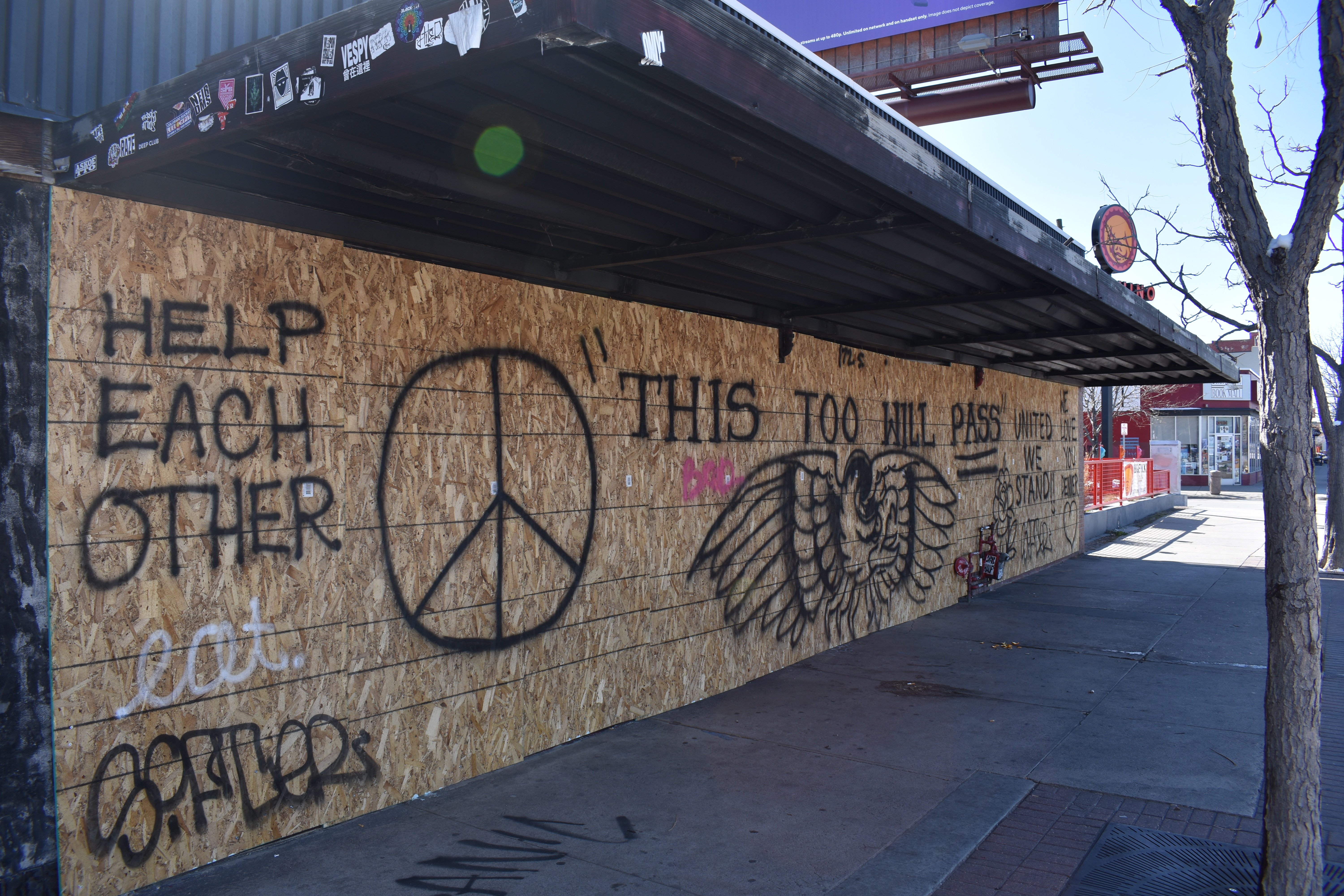
Businesses in downtown Denver, such as Think Tank Tattoo on South Broadway, were boarded up for security reasons during the pandemic lockdown.
For me it was one of the first press conferences with the Mayor of Denver. Mayor Hancock was explaining that they would be going into a stay-at-home order, and someone asked about liquor stores and marijuana dispensaries and whether they were “essential” and he joked that liquor stores were essential to him, but deferred to his staff member who announced that in fact liquor stores would be closing at midnight and not reopening until further notice. I thought “Uh-oh” and within half an hour there were lines of people six feet apart circling the blocks of liquor stores throughout Denver. They realized that had been a mistake and lifted it almost immediately, but “I survived Denver Prohibition March 23, 2020, 3pm to 5pm” t-shirts seemed to almost be immediately for sale online.
- Shaun Boyd, Curator of Archives
By the end of April, it started to set in that this was something that was going to be with us for a lot longer than my supply of toilet paper I was hoarding. When we began to adapt, pivoting the business plan, planning to reopen the museum, connecting with our patrons online—all the ways we were going to live with Covid as opposed to how to just ride it out—that was when it became real.
- Kelly Williams, Managing Director, History Colorado Center
Covid-19 became real for me in the late spring and early summer. The perpetually empty grocery stores reminded me of how empty shelves wound up when we prepared for hurricanes back home in Florida. The difference is the lack of recovery. A year later, it’s still difficult to find basic goods like apples in my community.
It was also the doom scrolling, knowing my cousin in New York City was working in makeshift Covid units at a hospital without proper protection, the worry that comes from knowing others are suffering and there’s only so much you can do as an individual. It became the most real when the existential fear set in with the knowledge that there was no end in sight and no help.
- Al Melton, Director, Trinidad History Museum
Covid-19 became real for me very soon into the pandemic when my partner's law school graduation, slated for early May, was canceled. Around the same time, there was serious talk that the bar exam would possibly be canceled or postponed. This hit us pretty hard because of all of the hard work and effort that he, and so many of his classmates, put in for three full years. Luckily, the CU-Boulder Law School was able to continue with a virtual graduation ceremony and the bar exam continued to be on the same day. However, it had to be administered at three separate locations as opposed to one. Additionally, we had plans to travel to Europe once he graduated and passed the bar. Obviously, those plans did not come to fruition.
- Katie Bush, Digital Imaging Studio Manager
Covid became real when . . . I became isolated from family, not able to visit . . . and the death of so many . . . the world was out of balance . . . but knowing that one day it would be a part of our living stories and history.
- CJ Brafford, Director, Ute Indian Museum
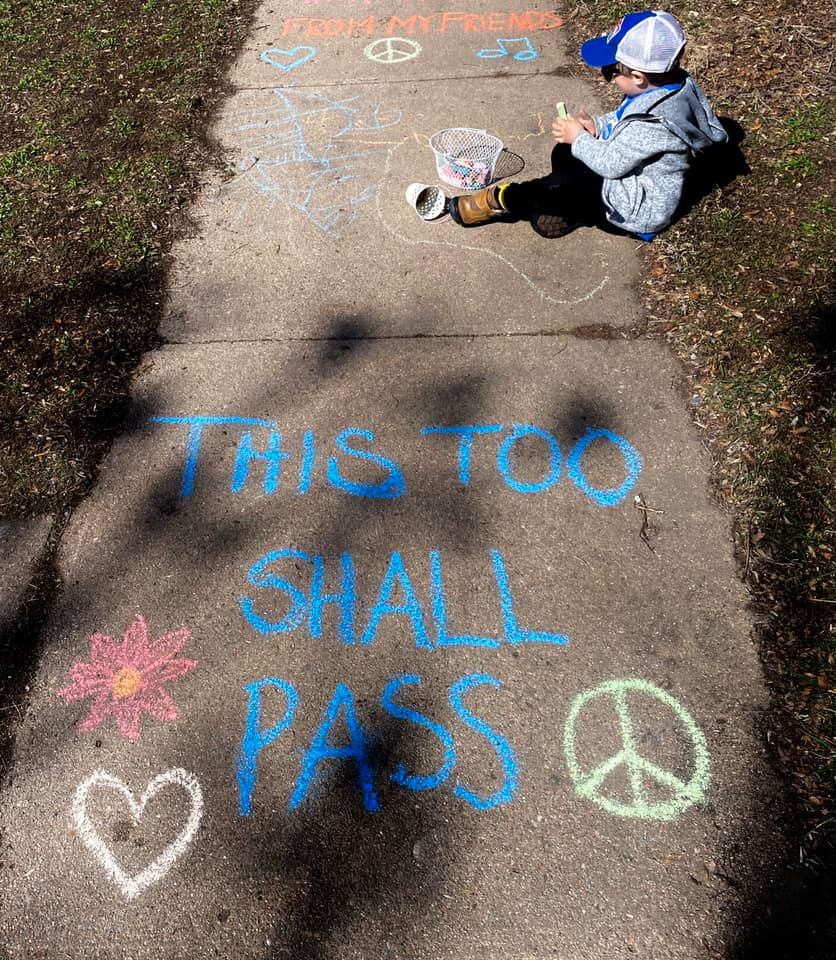
Marissa Page and her son made chalk drawings on a neighborhood sidewalk to pass the time and lift spirits during the stay-at-home order of spring 2020. Photo by Marissa Page.
More from The Colorado Magazine
Hindsight 20/20 The Colorado Magazine asked twenty of today's most insightful historians and thought leaders to share their visions of how 2020 will go down in history.
Colorado Is My Classroom More than a century ago, open-air classrooms had a moment in response to another pandemic. Then it was tuberculosis, another era-defining airborne pathogen that attacked the respiratory system. And the results were encouraging. Could fresh air be part of the solution to school in the time of coronavirus?
Historic Hardware May Help Fight COVID-19 As a preservationist working from home in a 1930s Art Deco apartment building, I have often lamented the fact that so much historic door hardware has been painted over, forever dulling the lovely details that add character and art to our everyday lives. I don’t consider myself an artistic person, so my interest in these seemingly basic details relates to my appreciation of what seems like unattainable creativity on my part.
